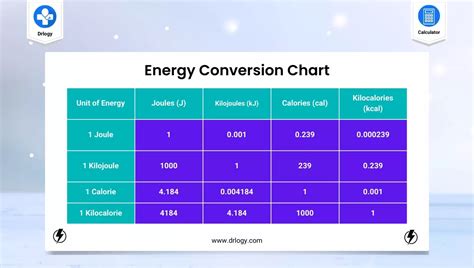The conversion of energy into power is a fundamental concept in the realm of physics and engineering, with far-reaching implications in various fields, including electrical engineering, mechanical engineering, and renewable energy. At its core, energy represents the capacity to perform work, while power signifies the rate at which work is done. The ability to calculate and convert between these two physical quantities is essential for designing, optimizing, and operating a wide range of systems and devices. In this context, an energy to power conversion calculator tool is an indispensable asset, providing a straightforward and efficient means of performing these conversions.
Key Points
- Understanding the distinction between energy and power is crucial for accurate calculations and conversions.
- The formula for converting energy into power involves dividing the energy by the time over which it is expended.
- An energy to power conversion calculator tool simplifies this process, reducing the likelihood of errors and increasing efficiency.
- Such tools are adaptable to various units of measurement, including joules for energy and watts for power.
- Applications of energy to power conversion are diverse, encompassing electrical circuits, mechanical systems, and energy production facilities.
Principles of Energy and Power Conversion

The conversion from energy to power is grounded in the basic physical principle that power (P) is equal to energy (E) divided by time (t), expressed as P = E/t. This relationship highlights the inverse proportionality between power and time; as the time over which energy is expended increases, the power decreases, and vice versa. An energy to power conversion calculator tool leverages this formula to facilitate quick and accurate conversions, accommodating different units of measurement to cater to a wide range of applications.
Operational Parameters of Conversion Tools
Efficient energy to power conversion calculator tools are designed with user convenience and precision in mind. They typically require the user to input the amount of energy and the time period, after which the tool calculates and displays the resulting power. The adaptability of these tools to handle various units (e.g., joules, kilowatt-hours for energy, and watts, kilowatts for power) ensures their applicability across different domains, from calculating the power output of a renewable energy system to determining the energy efficiency of an electrical appliance.
| Energy Unit | Power Unit | Conversion Factor |
|---|---|---|
| Joules (J) | Watts (W) | 1 J/s = 1 W |
| Kilowatt-hours (kWh) | Kilowatts (kW) | 1 kWh = 3.6 MJ, 1 kW = 1000 W |

Applications and Implications

The applications of energy to power conversion are diverse and widespread. In the context of electrical engineering, such conversions are essential for designing and operating electrical circuits, where the power rating of components and the overall system efficiency are critical factors. Similarly, in mechanical engineering, understanding the power output of a system, based on its energy input and operational time, is vital for optimizing performance and efficiency. Moreover, in the realm of renewable energy, accurately converting energy into power helps in assessing the viability and potential of different energy sources, such as solar and wind power, which are intermittent by nature.
Technological and Environmental Considerations
The technological and environmental implications of efficient energy to power conversion are profound. As the world transitions towards more sustainable and renewable energy sources, the ability to accurately convert and manage energy becomes increasingly important. This not only enhances the efficiency of energy systems but also contributes to reducing carbon footprints and mitigating climate change. Furthermore, advancements in conversion technologies and tools facilitate the development of more sophisticated and efficient energy systems, paving the way for a more sustainable future.
In conclusion, an energy to power conversion calculator tool is a vital instrument in the toolbox of engineers, researchers, and professionals working in the energy sector. By providing a straightforward means of converting between energy and power, these tools play a critical role in optimizing system performance, enhancing efficiency, and promoting the adoption of renewable energy sources. As the global energy landscape continues to evolve, the importance of accurate and efficient energy to power conversion will only continue to grow, underscoring the need for advanced, user-friendly, and accessible conversion tools.
What is the primary formula used for converting energy into power?
+The primary formula for converting energy into power is P = E/t, where P represents power, E represents energy, and t represents time.
How do energy to power conversion calculator tools enhance efficiency and accuracy in energy management?
+Energy to power conversion calculator tools enhance efficiency and accuracy by providing a quick and reliable means of converting between different units of energy and power, reducing the likelihood of human error and increasing the speed of calculations.
What are some of the key applications of energy to power conversion in real-world scenarios?
+Key applications include designing and operating electrical circuits, optimizing mechanical systems, and assessing the viability of renewable energy sources. These conversions are essential for ensuring system efficiency, safety, and environmental sustainability.
Meta Description: Calculate power from energy with ease using our comprehensive guide to energy to power conversion, exploring the principles, applications, and tools essential for efficient energy management.


